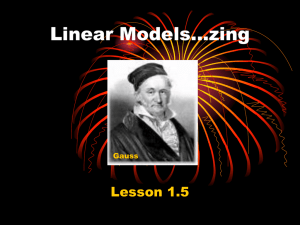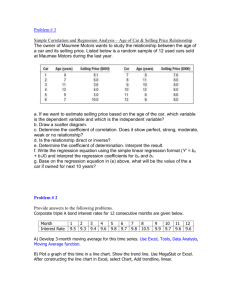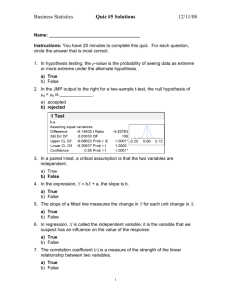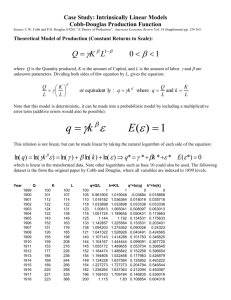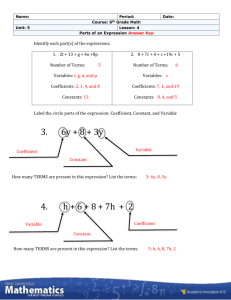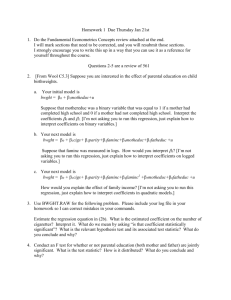statistics unable to solve these questions
advertisement
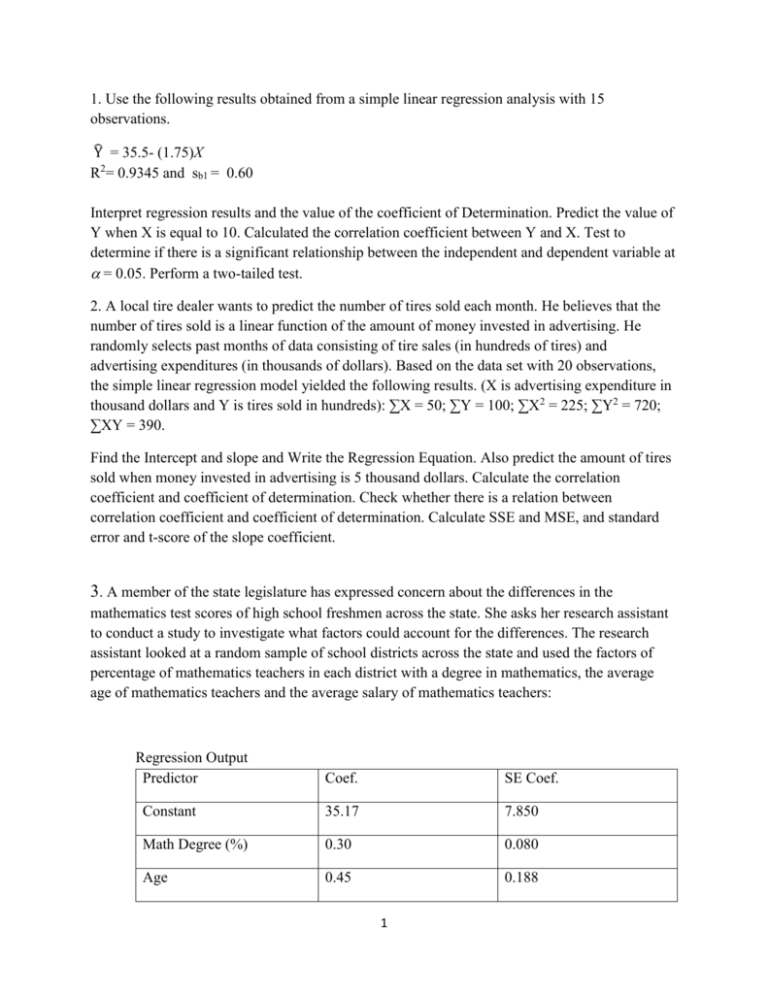
1. Use the following results obtained from a simple linear regression analysis with 15 observations. ̂ Y = 35.5- (1.75)X R2= 0.9345 and sb1 = 0.60 Interpret regression results and the value of the coefficient of Determination. Predict the value of Y when X is equal to 10. Calculated the correlation coefficient between Y and X. Test to determine if there is a significant relationship between the independent and dependent variable at = 0.05. Perform a two-tailed test. 2. A local tire dealer wants to predict the number of tires sold each month. He believes that the number of tires sold is a linear function of the amount of money invested in advertising. He randomly selects past months of data consisting of tire sales (in hundreds of tires) and advertising expenditures (in thousands of dollars). Based on the data set with 20 observations, the simple linear regression model yielded the following results. (X is advertising expenditure in thousand dollars and Y is tires sold in hundreds): ∑X = 50; ∑Y = 100; ∑X2 = 225; ∑Y2 = 720; ∑XY = 390. Find the Intercept and slope and Write the Regression Equation. Also predict the amount of tires sold when money invested in advertising is 5 thousand dollars. Calculate the correlation coefficient and coefficient of determination. Check whether there is a relation between correlation coefficient and coefficient of determination. Calculate SSE and MSE, and standard error and t-score of the slope coefficient. 3. A member of the state legislature has expressed concern about the differences in the mathematics test scores of high school freshmen across the state. She asks her research assistant to conduct a study to investigate what factors could account for the differences. The research assistant looked at a random sample of school districts across the state and used the factors of percentage of mathematics teachers in each district with a degree in mathematics, the average age of mathematics teachers and the average salary of mathematics teachers: Regression Output Predictor Coef. SE Coef. Constant 35.17 7.850 Math Degree (%) 0.30 0.080 Age 0.45 0.188 1 Salary 0.15 0.075 DF SS Regression 3 1120.5 Residual Error 28 530.8 Analysis of Variance Source Write the least squares prediction equation. What is the number of observations in the sample? Based on the multiple regression model given above, estimate the mathematics test score and calculate the value of the residual, if the percentage of teachers with a mathematics degree is 50.0, the average age is 45 and the average salary is $48,000. If the actual mathematics test score for these factors is 68.50, what is the error for this observation? What is the total sum of squares? What is the explained variation? What is the mean square error and the standard error of estimate? 4. For the results given in question # 3 above, calculate the Coefficient of Determination and the Adjusted coefficient of Determination and Test for the overall usefulness of the model using FStatistic at 5% and 1% significance levels. Finally, test the usefulness (or significance of the three independent variables using t-test for 5% and 1% significance levels. 5. The following table gives the data for per capita income in thousands of US dollars with the percentage of the labor force in Agriculture and the average years of schooling of the population over 25 years of age for 15 developed countries in 2000 (data modified for educational purpose). Develop a multiple regression model for per capita income (dependent variable) using Excel or MegaStat and answer the questions below the table. You can use symbols Y, X1 and X2 for the variables in your calculation. Show your computer output. Country number per capita % of labor in Agriculture Average years of schooling 1 20 9 7 2 26 10 12 3 24 8 11 4 21 7 11 5 22 10 12 2 5 42 4 16 7 27 5 11 8 24 5 9 9 28 6 12 10 32 8 14 11 30 7 12 12 40 4 16 13 34 9 14 14 30 5 10 15 35 8 13 Find the Y-intercept and slopes for the two independent variables and interpret them. Predict the per capita income when percentage of labor force in Agriculture is only 3 and average years of schooling is 15. Find the overall explanatory power (Coefficient of Determination) of the model and interpret it. Also find the adjusted coefficient of Determination and interpret it. Find the standard error of estimate. From the ANOVA table find SSR, SSE and SST and the F-value. Perform the F-test and comment on the overall usefulness of the model Perform t-test for the statistical significance of individual coefficients. 3
